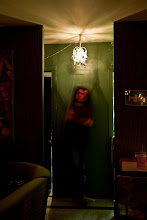
These brothers confuse me. I found "Fargo" depressing, "The Man Who Wasn't There" irritating and "Raising Arizona" delightful. I'll enjoy one of their films for awhile and then a new character, plot twist or set piece will be thrown in that clashes with everything else. They also often venture into emotionally twisted, dark corners that I don't necessarily want to explore for two hours. So I wasn't sure about seeing "No Country For Old Men," but figured I'd give it a shot, since I'm a sucker for contemporary westerns (Extreme Prejudice, El Mariachi, The Three Burials of Melquiades Estrada) and their revisionist cousins (El Topo, Unforgiven, Dead Man.)
Surprisingly, I liked the film right away. There was no typical Coen quirkiness that I sometimes find distracting. The film, which basically outlines the trajectory of a desert drug deal gone wrong, took its time with each scene, but kept the characters and plot developing steadily. I could see with it's stark landscape and deliberate, yet unhuried pace,

"No Country For Old Men" had placed its dusty feet in the slow-paced, rural crime narratives and morally-ambiguous westerns established by films like Bonnie and Clyde, Badlands, Electra Glide in Blue, and The Wild Bunch. From the very first frame, the Coens were clearly and successfully continuing the genre play of these earlier films. In addition, the script and actors had just enough personality in the characters to give them all different shades of humanity and moral intention. And there was no musical score, which I actually thought was a great choice by the Coens. Without music, I was more interested in the minutae of character movement, body language and cinematography. So for most of the film, I was truly engaged in the experience of this quietly detailed, unfolding narrative.
But at the end, the Coen Brothers decided they needed to inject some greater "meaning" into their story. Which is something they often seem to unwisely do in their films. Without giving away any detail (don't worry, no spoilers,) it finishes with a rumination on the affects of choosing work on both ends of the law. A quick series of character scenes verbally and physically express ideas of duty, vocation, luck and violence that were better implied by the actions of the characters. To me, this ending not only broke the "show don't tell" rule of storytelling, but also disrupted the film's natural pace. The actions of the characters took me on a visual meditation from sand-drenched to beautifully benign scenery while encouraging a reflection on the ways in which the violence of men is dealt with by different generations. Those ideas did not need explicit explanation or further symbolic association. So while I enjoyed the slow and bloody burn of "No Country For Old Men," the Coens ultimately opted for a density of ideas over a clarity of vision.

1 comment:
Thanks for writing this.
Post a Comment